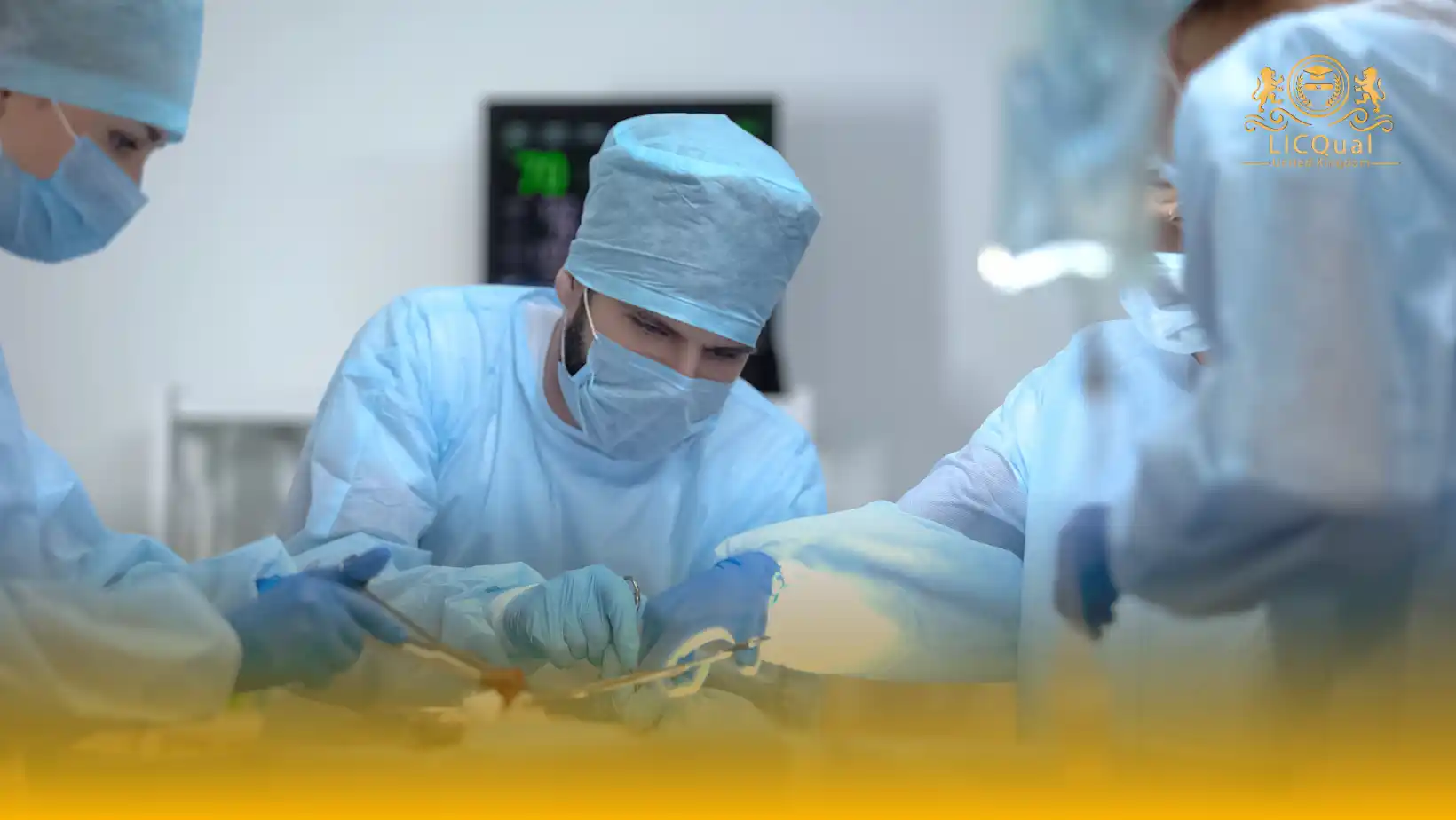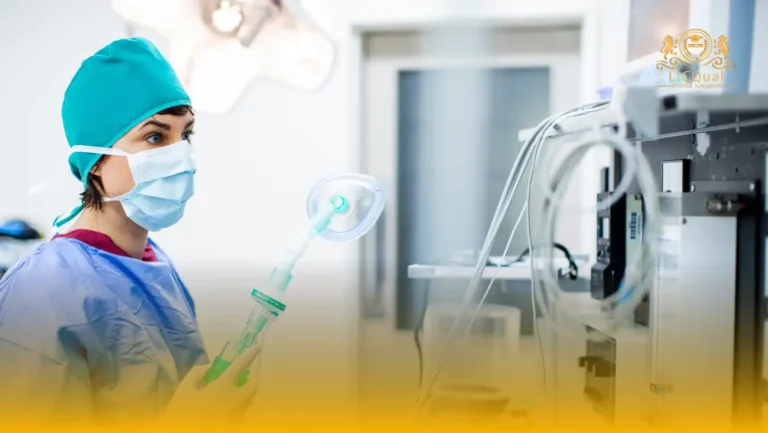The LICQual Level 3 Certificate in Cardiothoracic Surgery (Cert CTS) is a highly specialised qualification designed for healthcare professionals who aim to advance their expertise in cardiothoracic surgical practices. This course is not intended for beginners; it is specifically tailored for individuals already working in medical or surgical environments who wish to enhance their career prospects, deepen their knowledge, and strengthen their Continuing Professional Development (CPD).
Learners undertaking this programme will gain an in-depth understanding of cardiothoracic surgery, including pre-operative and post-operative care, surgical techniques, patient safety, and the latest advancements in the field. The curriculum has been developed to meet international standards, ensuring that learners acquire both practical skills and theoretical knowledge essential for professional growth.
Centres offering the LICQual Level 3 Certificate in Cardiothoracic Surgery must maintain the highest standards of training delivery. This includes employing competent and qualified staff, providing access to all necessary training materials, and ensuring that learners have a supportive environment to achieve success. With a focus on quality education and professional development, this qualification equips learners with the expertise required to excel in highly specialised cardiothoracic roles.
Ideal for surgeons, surgical nurses, and healthcare practitioners working in cardiac and thoracic care, this course represents a significant step forward in professional growth. By completing this qualification, learners will be better positioned to take on advanced roles, contribute to improved patient outcomes, and remain at the forefront of cardiothoracic surgical practice.
Course Overview
Qualification Title
LICQual Level 3 Certificate in Cardiothoracic Surgery (Cert CTS)
Total Units
6
Total Credits
24
GLH
120
Qualification #
LICQ2200862
Qualification Specification
To enroll in the LICQual Level 3 Certificate in Cardiothoracic Surgery (Cert CTS) , applicants must meet the following criteria:
|
Qualification# |
Unit Title |
Credits |
GLH |
|---|---|---|---|
|
LICQ2200862-1 |
Principles of Cardiothoracic Surgery |
4 |
20 |
|
LICQ2200862-2 |
Pre-operative Care and Assessment |
4 |
20 |
|
LICQ2200862-3 |
Surgical Techniques in Cardiothoracic Surgery |
4 |
20 |
|
LICQ2200862-4 |
Post-operative Care and Recovery |
4 |
20 |
|
LICQ2200862-5 |
Advanced Cardiac and Thoracic Procedures |
4 |
20 |
|
LICQ2200862-6 |
Professional Practice and Continuous Development |
4 |
20 |
By the end of this course, learners will be able to:
Unit 1: Principles of Cardiothoracic Surgery
- Understand the anatomy and physiology of the heart, lungs, and thoracic structures.
- Explain the principles and objectives of common cardiothoracic surgical procedures.
- Apply infection control and patient safety protocols in surgical settings.
- Demonstrate knowledge of pre-operative patient assessment and preparation.
Unit 2: Pre-operative Care and Assessment
- Conduct comprehensive pre-operative evaluations and risk assessments.
- Develop patient care plans including pre-operative education and consent processes.
- Prepare surgical environments and instruments to meet safety standards.
- Identify potential pre-operative complications and implement mitigation strategies.
Unit 3: Surgical Techniques in Cardiothoracic Surgery
- Demonstrate understanding of core cardiothoracic surgical procedures.
- Apply both minimally invasive and open surgical techniques under supervision.
- Handle and maintain surgical instruments and devices safely.
- Assist effectively during surgical procedures in compliance with clinical standards.
Unit 4: Post-operative Care and Recovery
- Monitor patients during immediate post-operative recovery.
- Implement pain management strategies and provide patient support.
- Identify and respond to post-operative complications effectively.
- Plan and support patient rehabilitation and long-term recovery.
Unit 5: Advanced Cardiac and Thoracic Procedures
- Describe complex cardiac and thoracic surgical interventions.
- Apply advanced surgical techniques and technology under supervision.
- Evaluate patient outcomes and post-operative progress.
- Integrate evidence-based practice into advanced surgical care planning.
Unit 6: Professional Practice and Continuous Development
- Demonstrate knowledge of ethical, legal, and professional responsibilities in surgery.
- Apply principles of clinical governance and patient safety.
- Evaluate evidence-based practices in cardiothoracic surgery.
- Develop a plan for Continuous Professional Development (CPD) to enhance professional skills.
The LICQual Level 3 Certificate in Cardiothoracic Surgery (Cert CTS) is designed for healthcare professionals who are already working in medical or surgical environments and want to strengthen their expertise in heart, lung, and thoracic surgical care. This Cardiothoracic Surgery Level 3 course is ideal for doctors, surgical trainees, nurses, and allied health professionals seeking CPD accreditation, career advancement, and an internationally recognized qualification. It is not intended for beginners but for those aiming to expand their specialist knowledge and clinical skills in cardiothoracic surgery.
1. Medical Doctors and Physicians
- Enhance diagnostic and surgical decision‑making in cardiothoracic care
- Gain advanced knowledge of thoracic anatomy and surgical techniques
- Improve patient outcomes with evidence‑based perioperative practices
- Strengthen expertise in managing complex cardiac and lung conditions
- Earn a globally recognized cardiothoracic surgery certification
2. Surgical Trainees and Residents
- Build a strong foundation in cardiothoracic surgical principles
- Learn pre‑operative and post‑operative patient management
- Gain exposure to modern surgical techniques and safety protocols
- Strengthen clinical confidence in high‑pressure surgical settings
- Fulfill CPD requirements while advancing surgical training
3. Nurses and Allied Health Professionals
- Develop confidence in supporting cardiothoracic surgical teams
- Learn patient‑centered approaches to perioperative care
- Expand scope of practice with specialized surgical training
- Gain CPD credits for professional development
- Increase employability in hospitals and surgical centers
4. Cardiothoracic Surgical Assistants and Technicians
- Enhance technical skills in surgical preparation and assistance
- Learn advanced protocols for patient safety and recovery
- Strengthen knowledge of surgical instruments and procedures
- Gain recognition with a Level 3 Cardiothoracic Surgery qualification
- Broaden career opportunities in surgical support roles
5. Public Health and Community Health Professionals
- Understand the growing importance of cardiothoracic health globally
- Learn preventive strategies for cardiovascular and thoracic conditions
- Support awareness programs in heart and lung health
- Gain skills to manage common cardiothoracic issues at primary care level
- Strengthen role in public health and patient advocacy initiatives
6. Healthcare Educators and Trainers
- Integrate cardiothoracic surgery knowledge into teaching programs
- Enhance credibility with an international certification
- Support students with up‑to‑date surgical and clinical insights
- Strengthen academic and professional profiles
- Contribute to evidence‑based education in surgical sciences
7. International Healthcare Professionals
- Obtain a globally recognized cardiothoracic surgery certificate
- Align with UK and international healthcare standards
- Improve career mobility across countries and regions
- Gain competitive advantage in global surgical healthcare markets
- Access structured, flexible learning designed for busy professionals
Centres delivering the LICQual Level 3 Certificate in Cardiothoracic Surgery must maintain the highest standards of training to ensure learner success. Requirements include:
- Qualified Staff: Centres must employ competent and experienced healthcare professionals, including surgeons, surgical nurses, and clinical educators, to deliver both theoretical and practical training.
- Training Facilities: Centres should provide fully equipped surgical labs, clinical simulation facilities, and access to real clinical environments for practical sessions.
- Learning Resources: All necessary learning materials, including textbooks, surgical instruments, and digital resources, must be available to support comprehensive training.
- Health and Safety Compliance: Centres must adhere to strict health and safety protocols, infection control procedures, and clinical governance standards to ensure learner safety.
- Assessment and Support: Centres should implement robust assessment procedures and provide ongoing learner support, including mentoring, feedback, and guidance throughout the course.
- CPD and Professional Development: Centres should encourage and facilitate Continuous Professional Development (CPD) opportunities, keeping learners up to date with the latest practices and innovations in cardiothoracic surgery.
By meeting these requirements, centres ensure a high-quality learning experience that equips learners with the skills, knowledge, and professional competence required to excel in specialised cardiothoracic surgical roles.
Assessment and Verification
All units within this qualification are subject to internal assessment by the approved centre and external verification by LICQual. The qualification follows a criterion-referenced assessment approach, ensuring that learners meet all specified learning outcomes.
To achieve a ‘Pass’ in any unit, learners must provide valid, sufficient, and authentic evidence demonstrating their attainment of all learning outcomes and compliance with the prescribed assessment criteria. The Assessor is responsible for evaluating the evidence and determining whether the learner has successfully met the required standards.
Assessors must maintain a clear and comprehensive audit trail, documenting the basis for their assessment decisions to ensure transparency, consistency, and compliance with quality assurance requirements.







